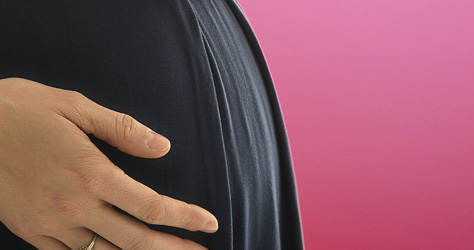Constipation can start early in pregnancy and is caused by both the hormonal and physical changes in your body.
Unfortunately, it's often part and parcel of pregnancy for many women, but worry not, there are some things that you can do to help.
At a glance
- Constipation is a common complaint during pregnancy
- Iron tablets prescribed in pregnancy can contribute to constipation
- You can help ease constipation by upping your fibre intake

What is constipation and why does it happen in pregnancy?
Constipation is the term given to difficulty in passing stools and is very common in pregnancy. This is due to those pesky pregnancy hormones wreaking havoc on your digestive system. They cause the muscles in your bowels to relax — affecting their ability to work at a normal pace, allowing food to hang around longer in the digestive tract.
On top of this, your expanding uterus takes up much of the space normally occupied by your bowel, giving it less room to go about its daily (you wish!) business.
Iron tablets - often prescribed during pregnancy for a low iron count - also commonly have a side effect of constipation. If you experience this, speak to your GP or midwife and see if you can change to a different type. Alternatively, you may want to try some alternative iron supplements from the pharmacy such as Spatone or Fluorodix as these may be easier on your digestion.
What are the symptoms of constipation?
Symptoms of constipation include the inability to pass a stool for a prolonged period, or passing hard, pellety stools. You may feel as though you haven't completely emptied your bowel. You may also feel abdominal pain or discomfort.
What are the treatments and remedies for constipation in pregnancy?
The best way of trying to combat constipation is to step up the amount of fibre you're eating as part of your healthy pregnancy diet. Choose wholegrain and wholewheat bread, pasta and cereals; fibrous veg such as asparagus; broccoli; cauliflower, Brussels sprouts, celery, and greens; fibrous fruit such as plums, peaches, nectarines, apples and pears, and bran.
Drink plenty of water as this helps to ease constipation. Taking some light exercise, such as walking or swimming, can also help get things moving.
If self-help methods don't bring you relief from constipation, speak to your pharmacist. Many medicines are safe to take in pregnancy, but don't buy an over-the-counter remedy without checking with your pharmacist first.